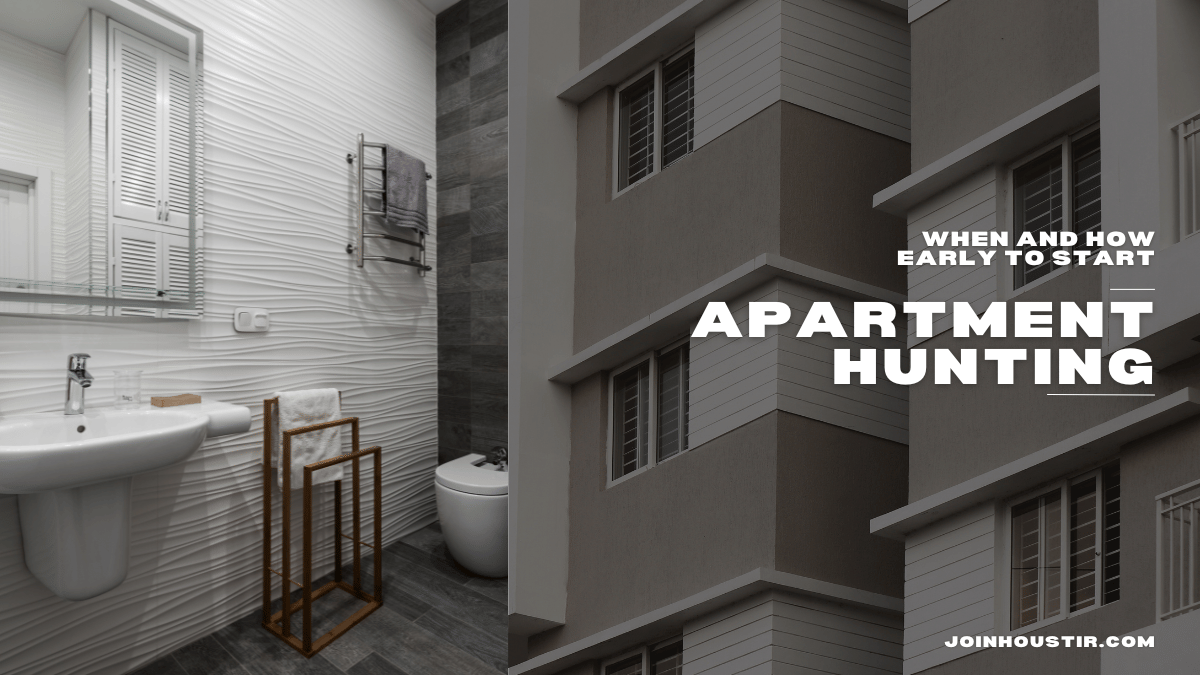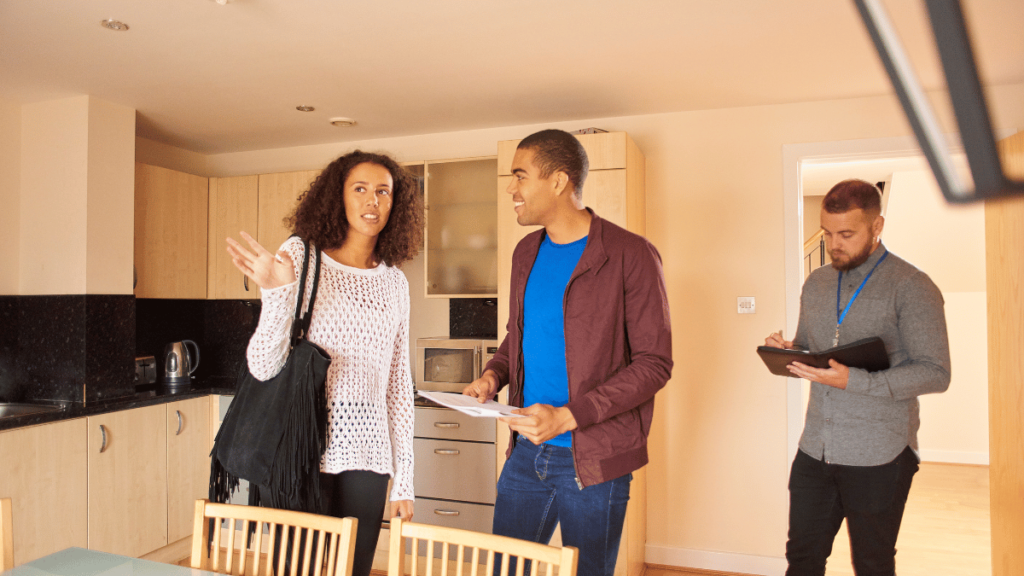Finding the perfect apartment can be exciting, but it often comes with stress and uncertainty, especially when it comes to timing. Many renters wonder how early to start apartment hunting to secure the best options and avoid the rush. Starting too late can lead to limited choices, while starting too early might cause issues with availability. So, how do you strike the perfect balance and begin your search at the right time?
In this guide, we’ll break down how early to start apartment hunting to give you the best chance of finding your dream home without added pressure. By following a strategic timeline, you can reduce stress, secure the best deals, and ensure you’re fully prepared for your move. Whether you’re a first-time renter or experienced in the rental market, timing is key to a successful and smooth apartment search.
Start looking for a new place 60 to 90 days before your lease ends. This allows you to find better opportunities. Rental market trends show that landlords need a 60-day notice to vacate.
Early planning gives you time to think and choose wisely. It helps you avoid making hasty decisions. Tools like Apartment List can also help you find the right place, making your search more focused.
In today’s competitive rental market, timing is everything. Starting early gives you more options and helps you avoid making a rushed decision. This leads to finding a place that truly feels like home. Plan your move carefully to make it stress-free and align with your life plans.
Why Timing Matters in Apartment Hunting
Timing is key when looking for an apartment. It helps avoid moving stress and makes the move easier. Knowing the best times to start your search can really help.
Stress and Anxiety in Moving
Moving can be very stressful. It’s one of the most stressful life events because of all the tasks and unknowns. Starting your search early can help reduce anxiety. It gives you time to look at options carefully and make choices without rush.
Avoiding Last-Minute Hassles
It’s important to avoid last-minute problems. Rushed searches can lead to missing important details, poor living conditions, or higher costs. Start looking 1-2 months early to have time to find and secure a place without feeling rushed.
In competitive areas like Los Angeles, start even earlier, three months before. This way, you can find the right place without stress.
| Season | Apartment Availability | Competition | Price Trends |
|---|---|---|---|
| Spring & Summer | High | High | Increased |
| Fall & Winter | Low | Low | Decreased |
Also, matching your move with the right time can make the transition smoother. Start your search when you’re ready to actively look for an apartment. This way, you can find the perfect place and reduce stress.
When to Start Looking for Apartments
Finding the right time to start looking for apartments is crucial. A good apartment hunting timeline helps you make better choices. It also lets you see more options, making it easier to find your dream place.
Importance of a 60-90 Day Timeline
It’s best to start looking 60-90 days before you want to move in. This matches the renter’s notice period of 60 days. Starting early helps you plan better and avoid last-minute stress.
Factors Influencing Your Search Period
Several things can change how long you need to look for an apartment. These include:
- Current Lease Agreement: Make sure your search ends when your lease does to avoid problems.
- Employment Circumstances: Job changes can make your search more urgent or flexible.
- Rental Market Activity: Knowing when the market is busiest can help you get better deals.
- Moving Logistics: Book movers or a truck early and start packing well ahead of time.
Good planning and knowing these factors can make your search easier. It helps you find the perfect apartment that meets your needs.
| Task | Recommended Timeline |
|---|---|
| Start apartment search | 60-90 days before moving |
| Book movers/rent truck | 4-8 weeks before moving |
| Begin packing | Gradually, several weeks in advance |
| Confirm apartment paperwork/payments | 15 days before moving |
| Set up internet service | Close to moving day |
| Change address and set up mail forwarding | Before moving |
The Best Seasons for Apartment Hunting
Knowing when to look for an apartment can really help. The right time can affect how much you pay and what’s available. So, it’s smart to plan your search carefully.
High Season: Summer Months
May to September is the busiest time for finding apartments. About 41% of all moves happen then. This is because many leases end in summer, making more apartments available.
College towns see even more demand from April to September. This matches the school year.
But, looking for an apartment in summer means higher prices. Zillow says rental costs have gone up by 3.2% in the last year. In big cities like New York, prices can jump up in summer. For example, New York City’s average rent in June is around $4,726, compared to $4,064 in January.
Having a flexible budget can help you get a better deal during this busy time.
Low Season: Winter Months
Winter is a great time to find an apartment because fewer people move. Only 6% of moves happen in November and December. This means you might find lower prices.
Landlords might be more open to negotiating rent to fill empty apartments. Renting in November can be especially cheap, with possible incentives like rent discounts. Prices are often 5% lower from January to April, making these months ideal for those watching their budget.
| Month | Average Rent in New York | Rental Demand | Best Time to Rent |
|---|---|---|---|
| January | $4,064 | Low | Low Season |
| June | $4,726 | High | High Season |
To make the most of winter, start looking 30 to 60 days before you want to move. This gives you time to look at options and make a decision without the rush and high prices of summer.
How Early to Start Apartment Hunting
Finding out when to start looking for an apartment is key for both local move timelines and out-of-state relocations. Starting early can help you get the best deals and make the move smoother. Here are some tips for different types of moves.
Local Moves: 2-3 Months Before
For local moves, start your apartment search strategy about 2-3 months before you want to move in. This gives you enough time to look at different places, schedule visits, and handle the paperwork. Remember to give your current landlord at least 30 days’ notice to avoid extra fees.
- Starting early helps avoid last-minute problems.
- It lets you see many apartments and neighborhoods.
- It ensures all the paperwork is done before you move.
Out-of-State Moves: 4-6 Months Before
For out-of-state relocations, start looking 4-6 months ahead. This extra time helps with the challenges of seeing places from far away, learning about new areas, and planning the move.
- Booking tours takes more time because of the distance.
- It’s important to know the local rent rates and seasonal changes.
- Handling the move of your belongings across state lines is a big task.
Also, getting your rental application documents ready early can speed up the approval process. This makes your move smoother and more efficient.
| Type of Move | Recommended Start Time | Considerations |
|---|---|---|
| Local Moves | 2-3 Months Before | Provide landlord with 30-day notice, tour multiple apartments |
| Out-of-State Moves | 4-6 Months Before | Plan for long-distance logistics, prepare documents early |
Steps to Take 90 Days Before Moving
The 90-day mark is key in your moving timeline. Getting ready early can reduce stress and keep you organized. Use a detailed moving checklist to make sure you don’t miss any important steps.
Begin Your Search and Notify Your Landlord
Start looking for apartments 60 to 90 days before you want to move in. Look at different listings to find what fits your needs. This is also a good time to tell your landlord you’re leaving. Giving them notice on time helps avoid penalties and makes moving easier.
Start Decluttering and Create a Moving Budget
Decluttering starts around 90 days before your move. It helps you sort out what to keep, donate, or throw away. This way, you’ll have fewer things to move.
At the same time, start planning your moving budget. Look into moving companies, packing supplies, and storage costs. A good budget helps you manage your move’s expenses without surprises.
Planning Your Budget for the Move
Planning your rental expenses and moving budget is key to a smooth move. Knowing your costs and setting priorities helps avoid surprises. Here’s how to plan your budget well:
Using the 50/30/20 Rule
The 50/30/20 rule is a great way to budget for your move. It suggests using 50% of your income for needs like rent and utilities. Then, 30% for wants like dining out, and 20% for savings and debt.
This approach helps you save for deposits, the first month’s rent, and other moving costs.
Estimating Moving Costs
Getting an accurate moving cost estimate is important. Start by comparing moving companies to find a good deal. Remember to include costs like movers’ fees, truck rentals, packing materials, utility deposits, and storage needs.
Also, save for deposits like the security deposit and the first and last month’s rent. This is key in planning your rental expenses.
In summary, start looking for apartments a few months early to plan your budget. By using the 50/30/20 rule and making a detailed moving cost estimate, you can stay financially stable during your move.
- Start your apartment search and review your budget at least 2-3 months before your move.
- Aim to save for deposits and the first month’s rent early in the process.
- Compare moving companies to identify cost-savings options.
Remember, good rental expenses planning and a clear moving budget strategy are crucial for a successful move!
Finding the Right Neighborhood
Choosing the right neighborhood is key when looking for an apartment. Things like commute times, research, and access to amenities matter a lot. Picking a neighborhood that fits your lifestyle and needs makes living better.
Researching Commute and Convenience
When researching neighborhoods, think about commute and convenience. Look at how close you are to work, public transport, and important places like grocery stores and hospitals. A short commute can make your day-to-day life easier and less stressful.
- Determine the average commute time to your workplace.
- Check the availability of public transportation options.
- Evaluate nearby amenities such as grocery stores, parks, and healthcare facilities.
Evaluating Safety and School Systems
Safety and school quality are very important when picking a neighborhood. Look for areas that are safe for you and your family. Use online tools and local groups to learn about crime rates and safety.
| Factors | Description |
|---|---|
| Crime Rates | Check local crime statistics to ensure you choose safe neighborhoods. |
| School Districts | Good school districts are key for families with kids—all the more reason for careful school district considerations. |
Online neighborhood guides can give you a lot of information. They cover rent prices, local amenities, and living tips. This helps you make a smart choice.
Research and Compare Apartment Listings
Finding the perfect place to live starts with thorough research. Use the many resources available to help you. This way, you can make a smart choice.
Utilizing Online Listing Platforms
Platforms like Zillow, Apartments.com, and HotPads are great for searching. They let you filter by location, price, and amenities. This makes comparing apartments easier.
Make a spreadsheet to track important details like rent and amenities. It saves time and helps you see what each place offers. This is key for a good comparison.
Scheduling Walk-Throughs
Once you’ve narrowed it down, schedule tours. It’s important to do this early to get a spot. Look at things like windows, paint, and safety features during the tour.
- Window functionality
- Paint condition
- Wall and ceiling state
- Lighting and outlets
- Drawers and cabinets status
- Carpet cleanliness
- Strange smells or pest evidence
- Safety features like smoke detectors and secure entrances
Ask questions and take notes. This will help you remember what each place has. It’s crucial for making your choice.
| Platform | Features | Advantages |
|---|---|---|
| Zillow | Comprehensive listings, user reviews | Wide range of filters, local insights |
| Apartments.com | Detailed floor plans, 3D tours | High-quality images, robust search features |
| HotPads | Interactive maps, neighborhood data | Easy-to-use interface, detailed amenities info |
Use online platforms and plan tours carefully to find your new home. Start looking 10 weeks before you move to get the best deals.
Negotiating Your Rent
Rent negotiation is easier than many think, especially in winter. With more than a million new units in 2023, landlords might be willing to talk. Knowing the local rental rates helps you negotiate better.
Being a reliable tenant is key. Show you’re financially stable and have a good rental history. This makes you more attractive to landlords, even in tough markets.
Try offering benefits like a longer lease or prepaying rent. Landlords might see this as a win-win. They often give discounts for longer leases.
If rent talks stall, think about other lease terms. Ask for things like free parking or included utilities. Apartments that have been vacant for a while might be more open to deals.
Start talking about rent a few months before your lease ends. This gives everyone time to think. For more tips on negotiating rent, check out this guide.







